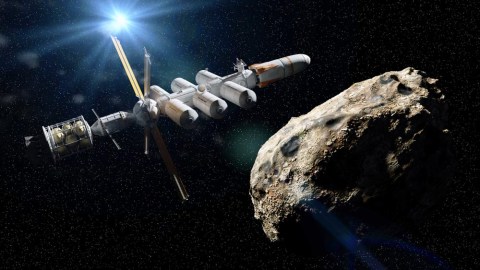How to keep peace in outer space? Create commercial development.

For most of human history, we’ve had a grand frontier on the horizon, ready to be explored, settled and conquered if need be. We are natural-born explorers. From one perspective, the entirety of human civilization has been a journey westward. From the cradle of civilization in Mesopotamia, in China and the Indus Valley where agricultural practices took root, onwards to Egyptian society and beyond to where Phoenicians, inspired by hieroglyphics, set the alphabet in stone, later to be used by Greek and Roman societies, the birthplaces of new empires, art and the foundation of modern Western societies.
Spinning westward like some ephemeral world destiny, technological advances from Gutenberg’s printing press to the microchip have taken us full circle around the globe.
Where do we have left to go, but up? Space is the premier frontier—a great challenge for our globalized world.
Our history, laden with nation-states waging threats of total war, now needs to give way to market-based competition and the collaboration and cooperation of international companies and countries alike. As we expand to the stars in the wild upness of space, we can strive for peace by creating stable environments for new space-markets to flourish. This next great human expedition in space doesn’t have to call for war or increased militarization. The grand expanse of space has a lot to offer for us if we approach it with humility and the right intentions. Here’s how we can keep space a peaceful place.
Market-based solutions for peace in outer space
Our intentions to conquer space have changed over the years. What was once a race between two superpowers is now a competition between international companies. Nowadays it’s even evolved into partnerships between nation-states and private companies. Space isn’t just big, it’s big business.
Governments and private entities have their own unique parts to play in space exploration and commercialization. Take for example the prospect of asteroid mining. There are potentially trillions of dollars floating around in space in the form of precious metals. Rather than limit or curb space innovation, the United States Congress in 2014 passed the Asteroid Act. In the bill’s own words:
“To promote the development of a commercial asteroid resources industry for outer space in the United States and to increase the exploration and utilization of asteroid resources in outer space.”
Any company that can successfully mine an asteroid will be able to claim its resources as private property. Entering into space is a lot easier than it once was. Overblown bureaucratic obstacles are coming down and space is more accessible for private companies. Bills like the Asteroid Act might be indicative of a larger trend: that governments can find better ways to utilize their space programs rather than for increased militarization and geopolitical maneuvering that harkens back to the Cold War. Instead, nation-states might be able to provide a fair regulatory framework for private enterprise and help foster their growth, leaving agencies like NASA to focus on long-scale research endeavors. There are just certain things that private industry does better. Take reusable rockets. “We’re starting to see advances made by private entities that are more significant than any advances in the last three years that were made by the government,” Chris Lewicki, CEO and President of Planetary Resources—a future hopeful asteroid mining company—tells Futurism. “The government was never able to [build reusable rockets], but now, two private companies within the space of the same year have done that.”
Private industry needs a stable environment in order to flourish and grow. In most cases, a natural side effect of this is peace. The last thing these companies want to contend with in the harsh frontier of space is militarization. Commercial interests are better suited to space for this very reason.
Frontrunners of the new frontier
Two of the big hitters in this new space age are Blue Origin and SpaceX, companies by Amazon CEO Jeff Bezos and Tesla CEO Elon Musk. In 2015, both of their companies were the first to ever successfully land a vertical rocket. Private companies aren’t chained to government processes and oversights. They can work faster and more efficiently. There’s a lot of opportunity for partnership between the two sectors. For example, NASA contracting SpaceX to deliver cargo to the International Space Station (ISS) and future human transport to be contracted by Boeing.
It can’t be stressed enough how important peaceful partnerships are for the future of space. So, what about relations between other nations? How does that stack up on the world stage?
A precedent for peace in space
Sometimes it feels like the Cold War never ended. Surprisingly, one of the greatest areas of U.S.-Russian cooperation has been in space. For nearly 20 years, the ISS has been a shining jewel of human cooperation between the two countries. Two space veterans, American Scott Kelly and Russian Mikhail Kornienko, both lived in space for an entire year together. Throughout the years the many American astronauts and Russian cosmonauts had a lot to say about their host country’s political struggles and their relations with each other.
Cosmonaut Alexander Samokutyaev on the subject of his life aboard the ISS once said: “We do our work that we love and we respect each other… Whatever the politicians want to get up to, that is their business.”
It’s different out in space; NASA analysts know that the U.S. and Russia need one another. Since the Space Shuttle flights stopped ferrying astronauts to the ISS, the U.S. has been dependent on Soyuz Russian rockets, while the entirety of the space station depends on NASA communication systems.
Russian space expert Vadim Lukashevich says, “Even though we are butting heads on Earth, up on the ISS we can’t work without them and they can’t work without us… It’s impossible to break up this cooperation.”
The Outer Space treaty
A patchwork of laws determines how space commerce and national interests function. The seminal law, signed and ratified by the United States and many other nations, is the Outer Space Treaty. Created back in 1967, it laid the groundwork for the future of how we’d interact and conduct ourselves in space.
Henry Hertzfeld, research professor at George Washington University’s Space Policy Institute, said of the treaty: “There’s an obligation to act safely, that space should only be used for peaceful purposes, nobody can launch any weapons of mass destruction, and freedom of access for all.”
While this treaty will serve as a great starting point, it is not the final arbiter of how to conduct ourselves in space. We’re going to have to figure that out for ourselves. There are a few steps we can take to get things in motion for our future space explorers.
The first step: Unified global projects
Right now there is a real problem surrounding the globe: space debris. Hundreds of thousands of objects have gathered in our skies. This multitude of debris can affect satellite trajectories, future space flights and orbital stations.
How is the international community dealing with this encroaching global problem? Currently, efforts are strained. In order to avoid collisions with this debris, we’d need a central database tracking where all this detritus is orbiting. That kind of database is difficult to compile because of the disparate nature of tracking that each nation implements. For example, the United States would never reveal if one of their unknown spy satellites was destroyed and created new debris. Basically, each country has their own secrets in the sky they don’t want to reveal as well as different methods of tracking their space junk. So that’s one problem that we have to overcome to create the central database—international space transparency!
However, some national space programs and private companies are working together to develop advanced tracking systems for the hundreds of thousands of pieces of space debris. One such effort is the Space Fence program, developed by Lockheed Martin for the U.S. government, which aims to track a catalog of 200,000 space objects. The need for a proto-space traffic control system is becoming ever more crucial in a developing space environment.
A governing body for space
Our current legal frameworks are insufficient to regulate and deal with a space that includes government and private companies alike. The absence of a governing body is something that will need to be remedied one day.
As outer space is the last bastion of global cooperation, we must work to ensure that it stays apolitical and with humanity’s best interests at heart. The international community can take steps to mitigate this one problem and set the stage for further coordination.
In the future, we can avoid taking our terrestrial-bound feuds to the stars. Through encouraging peaceful competitive markets and by shifting governmental forces to roles of regulation and research, we just might be able to create a new frontier of peace and prosperity.





